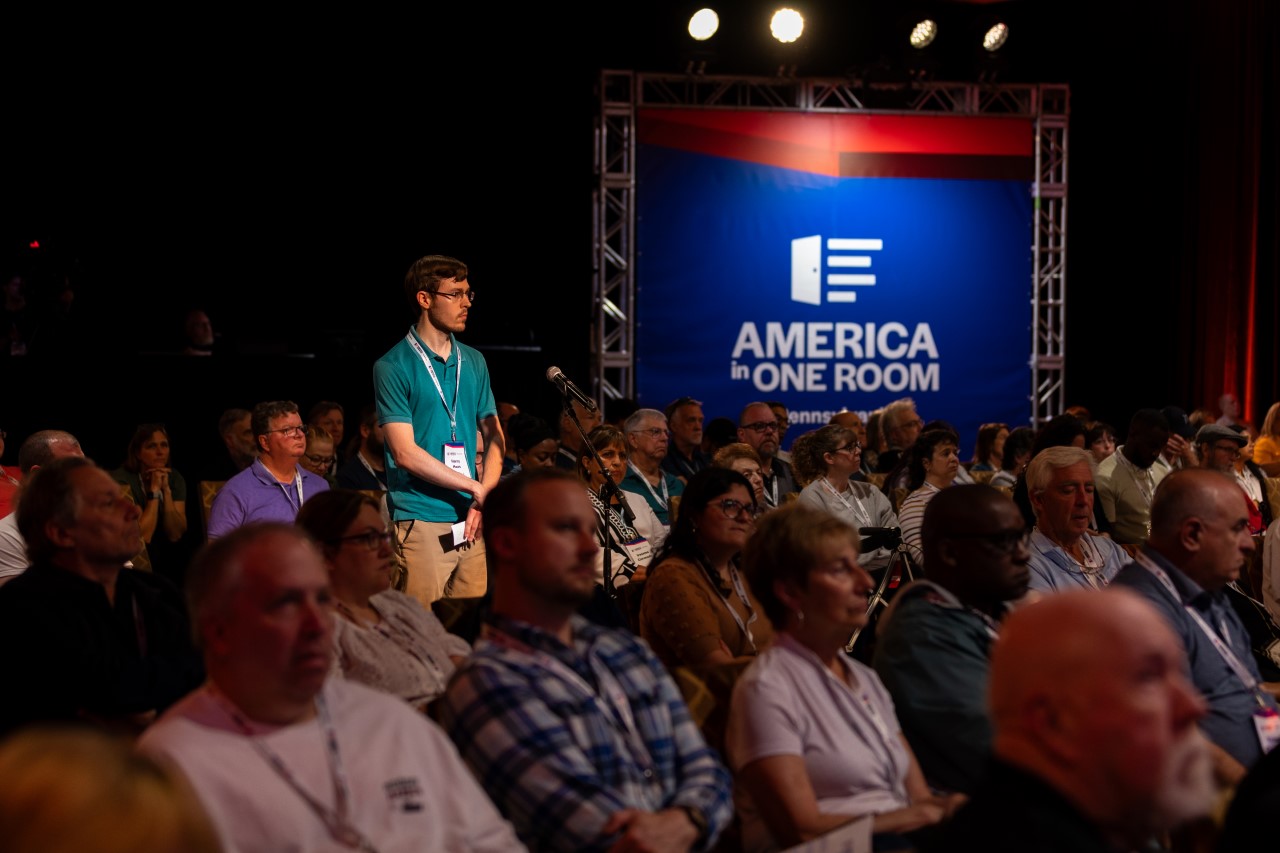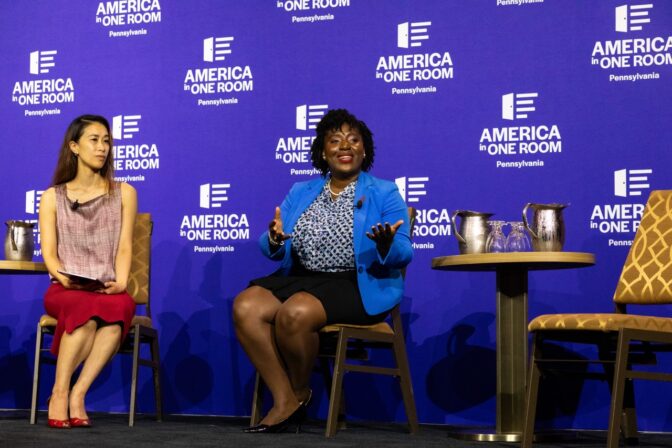July 9, 2025 | 9:44 AM
Voters dislike cuts to the Affordable Care Act, government subsidies for people who lose jobs to automation.
-
Jordan Wilkie/WITF
As the democracy reporter for WITF, I will cover any kind of story that has to do with how we govern ourselves. That will include doing a lot of election coverage about how to access the ballot, how public officials administer elections, the technology used to run and secure elections, and the laws that govern it all.
My work will also include accountability coverage for elected officials that use their positions to then undermine democratic institutions, like the legislators that voted against the certification of the presidential election results on January 6, 2021. If that weren’t enough, I foresee covering some local government decisions, fights over public records and transparency, and some candidate coverage in 2024. Many stories can have a “democracy frame” meant to help us all understand how our governments work and how we can shape them.
I’m most looking forward to the community reporting about which WITF is passionate. I’ll be talking to a lot of folks about what they want out of their governments, local to national, and how they want to make their visions reality. I’m excited to meet you and talk, with or without a microphone on hand.
I also like to turn my work phone off. When I do that, I’m looking for rocks to climb, trails to run on (slower and slower, somehow), and new places to visit. I’ve lived in the (extended) South for most of my life, so y’all will hear me say things funny and sometimes my hearing is funny, too, so we’ll figure out this radio thing together.

Alex Samuelian / America In One Room
A participant in the deliberative forum asks a panel of experts about a policy question one from one of the small discussion groups.
Rural health care and job training top a list of priorities set by a group of 175 Pennsylvanians who gathered last month at a forum where they heard from experts and built informed opinions about issues facing the state and federal governments.
A supermajority of more than 80% of the attendees went on to agree that state financial assistance to improve rural health care should be a priority, as well as improved access to trade schools and employment options, and U.S. Supreme Court justices should be held to the same binding code of ethics as other federal judges.
Capping the cost of colleges and universities in the state, putting term limits on both federal judges and state legislators, and expanding safe nuclear power plants all got over 75% support from the attendees.
The participants, chosen to reflect political and other characteristics of the state at-large, spent three days at a Philadelphia conference center learning about, debating, and taking a poll on about 60 policy proposals across election and voting reforms, education, immigration, housing, health care and energy production.
Participants also made it clear what they did not like. There was little support for Congress to repeal the Affordable Care Act, commonly called “Obamacare.” And there was little support for proposals for individualized government support, such as offering cash grants of $1,000/month to adults whose jobs are cut due to automation.
The event was an example of “Deliberative Polling,” a method for getting informed opinions from people on major issues of the day. It’s a model pioneered by Stanford University political scientist James Fishkin, who led the academic analysis of the Philadelphia event.
The process also allows observers like Fishkin to track how participants’ opinions change as a result of the deliberation.
“On the most polarized issues, there was a tendency for members of the two main parties to move closer together, and the people who took the most extreme positions to move somewhat closer together,” Fishkin said. “That shows that our divisions are not intractable.”

Alex Samuelian / America In One Room
Speaker of the House Joanna McClinton, a Democratic state representative from Delaware County, answers questions from participants. Republican state Sen. Joe Picozzi also answered questions on a different panel. Each elected official was only allowed to answer audience questions, not give pre-prepared statements.
By the end of the weekend, the participants also respected each other and their opinions more, the data showed.
Those changes fuel Fishkin’s belief that deliberative polling is a useful tool in a democracy, both to inform elected leaders what the public wants and to help the general public limit the fissures between people of different parties. More responsive governments and a less divided public are good things for a democracy.
People seem to change their opinions due to how deliberative polls are run, said Stephen Medvic, political science professor at Franklin & Marshall College, who is experienced in running similar public deliberations.
“The best way to define deliberation is the exchange of reasons,” Medvic said.
As people explain why they think what they think, it opens a different type of discussion that provides an opportunity for others to learn and change opinions. Those opinion changes don’t have an ideological basis, Medvic said, meaning that both Republicans and Democrats shift stances on certain topics.
In 2024, Medvic ran a similar forum called a “mini public” focused on getting feedback about democracy reforms in the state. Those results were broadly similar, deciding with a supermajority that civics education is important in high school and supporting with a strong majority a version of photo ID that doesn’t disenfranchise anyone.
Republicans, Democrats and independents at the Philadelphia forum all saw significant growth in their support for the U.S. increasing the number of visas given to low-skilled workers, with 20, 33 and 28 percentage point jumps respectively.
At other times, changes moved in opposite directions, though those shifts were usually smaller. After deliberation, Republicans softened their support for reducing the number of refugees allowed in the country by 6 percentage points, while Democrats increased support for a reduction by 4 points. Still, in the end, the two groups were far apart — a 40 point difference — on support for the policy, with 65% of Republicans still in favor of the reduction.
But because the participants covered so many topics in a relatively short timeframe, the impact of the deliberation may be somewhat muted, Medvic said. He’s confident that spending more time on a narrower set of issues would result in more movement of opinion and a deeper understanding of the topics, he said.
A handful of the state’s elected officials made appearances. Gov. Josh Shapiro gave opening remarks, while Democratic Speaker of the Pennsylvania House Joanna McClinton and Republican state Sen. Joe Picozzi answered audience questions about a range of policies.
In his more than 30 years of work on this issue, Fishkin said he has seen governments in states like Texas and countries like Mongolia take action based on deliberative polling results. He said he thinks elected officials should consider the results of the Pennsylvania forum.
How people’s opinions change during and after informed deliberation also teaches an important lesson for the health of democracy, he said.
”It’s possible for us to find a way forward on a lot of these issues if we keep talking, instead of if we continue castigating each other and vilifying each other,” Fishkin said.
Note: America In One Room, the name of the program that hosted the deliberative forum, makes its polling data public. Click the following links to view the executive summary, the change in opinion by party affiliation, and the comparison of change in opinion against a control group.
Disclosure: WITF News and LNP/LancasterOnline staff volunteered as session leaders for the two-day deliberative forum held in LNP’s newsroom in April and July 2024. Franklin & Marshall political scientists Stephen Medvic and Berwood Yost facilitated the forum. The Steinman Institute for Civic Engagement contributed staff and funding, and was at the time independently incorporated under Pennon, the same parent company over WITF and LNP.
A collection of interviews, photos, and music videos, featuring local musicians who have stopped by the WITF performance studio to share a little discussion and sound. Produced by WITF’s Joe Ulrich.

